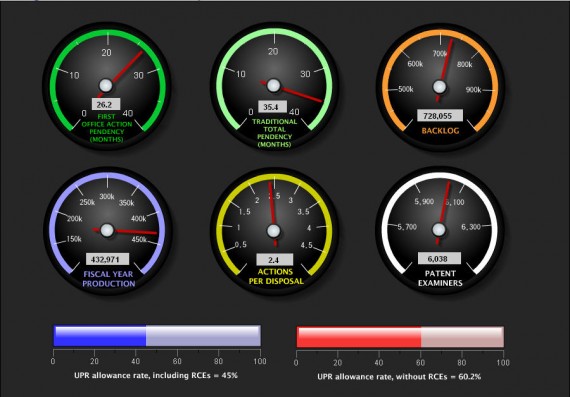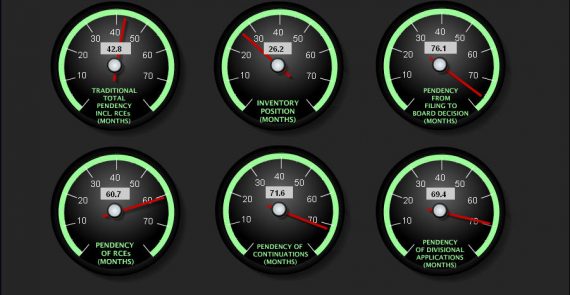Patent System Broken
Despite constantly hiring more examiners, the patent application backlog is 728,044 and it takes 6 years to get a decision.
Erik Sherman argues that “things are a disaster” at the U.S. Patent and Trademark Office.
Recent USPTO annual reports wouldn’t quite say just how big the backlog of unprocessed patent applications was. The office would talk about pendency — the amount of time it takes from when you file an application to when you have either a granted patent or a final no. And yet, officials insisted on counting reexamination requests, in which the applicant asked the office to reconsider a refusal, as completely separate applications, artificially lowering the real amount of time it might take to get a patent.
Now the USPTO has its data visualization center, with updated metrics. Kudos to [new director David] Kappos for doing something which should have been done long ago. People in any intellectual property-intense industry like high tech or pharmaceuticals have known that it took an eye-crossing amount of time to get patents. However, good lord, the numbers show how impossible the situation is there. Consider that recently the Department of Commerce, parent of the USPTO, has indicated that it wanted to see a 20 month real pendency. You could file a patent application and know in just over a year-and-a-half whether you were successful or not. Want a grim laugh? Look at these graphs from the USPTO web site (click on them for a larger view):
Under the old and deceiving definition of pendency, it would take an average of 35.4 months to get an answer on a patent application. The traditional pendency measure including RCEs as separate applications 42.8 months. The RCEs alone take over 5 years. However, if you look at the combination of initial applications and the continuations, the average pendency is 71.6 months. In other words, on the average it takes 6 years to get the final word on a patent application from the USPTO. If you appealed a decision to the Board of Patent Appeals and Interferences, it adds another six months to the process.
To put this in perspective, say that you had a child born on the same day you filed a patent application. By the time you got your answer, your kid would be well into first grade.
Backlog is now up to 728,044 patent applications. That’s with more than 6,000 patent examiners at work and the office processing 432,971 applications a year. How can this continue? Everything gets continually worse, year over year. The USPTO has continued to add examiners for a decade and the backlog has continued to grow.
Perhaps the answer is to drop technologies like software patents. By the time the six years have gone by, what you could have protected is likely already swept into industrial-sized dust bins. It’s particularly true of smaller companies, as a large-scale study found that high costs often deter companies from getting patents.
Who does that leave? Oracle (ORCL) suing Google (GOOG) for using open source Java, that was supposed to be available for everyone anyway? Apple (AAPL) suing HTC, or Nokia (NOK) suing Apple over who might be copying whom in handsets? Patents might have made business and economic sense when someone was capable of inventing the cotton gin or telephone. But given the thousands of patents on singularly insignificant features that can be involved in everyday devices and the amount of cross licensing necessary to engineer a new product, maybe it’s time to pull the plug and stop the madness.
I don’t have anything near the expertise to assess whether Sherman’s recommendation is the right one. And my libertarian instincts don’t extend to thinking intellectual property shouldn’t have strong protection. But the nature of software is such that six years is well beyond the useful life cycle of most products. If the system can’t be scaled, it has to be rethunk.



On top of that a new cottage industry has picked up, suing companies that sell products with expired patents. As covered on slashdot.
http://yro.slashdot.org/story/10/09/02/0013250/A-New-Species-of-Patent-Troll
I thought Copyright covered software admirably, and that Patents in that domain were always a mistake. I thought Copyright protections should be strong but short (in modern terms, no more than 50 years for anything).
What we’ve had, maybe in response to loss of position in American manufacturing, is a concerted effort by corps and government to extend intellectual property both in bounds and terms. We want protection on Windows and The Sopranos to be forever, so that even if we aren’t exporting Fords we are pulling down licensing and residuals.
We see this in the strong, strong, effort the government continues to make in tying IP protections (ever increasing IP protections) to trade (or just about any other) negotiation.
it is … almost Randian in its focus on squeezing from past innovators, never mind the damage to future generations. The world well be a cross-licensed IP mess, as the original article says, with IP portfolios managed by the big corps.
(of course with long lived IP, IP will flow to portfolios)
The increasing term of US patents here:
http://en.wikipedia.org/wiki/Term_of_patent_in_the_United_States#History
The increasing term of US copyrights here:
http://www.tomwbell.com/writings/(C)_Term.html
Shouldn’t the libertarian view be that the government has no place protecting patents and copyrights? his is the one area where “libertarians” get positively gooey over the idea of government protection.
My view is that government protection of patents and copyrights should be very narrow in scope only to preserve the intent of the framers for promoting the useful arts and sciences. Not for rent seeking which is where we are at now. Further a patent is worthless anymore unless you have buckets of cash to enforce it in court. Useless for the average inventor. Of course this view is counter to the interests of those who finance campaigns so …
“on the average it takes 6 years to get the final word on a patent application from the USPTO” WTF happened? Just 2 years ago I reveived my patent, after an almost 3 year wait. Have the qty of apps gone up drastically?
I have a hard time feeling sympathy for patent holders when there’s blatant dickheads like worlds.com getting patents that are so generic and ambiguous that they can be applied to products that other companies have had on the market for +20 years. There’s many many cases of rich companies getting patents just for the intent of making more money in the courts. Meanwhile your garage inventor cannot get a patent or even have it enforced due to a lack of funds. I don’t believe that copyrights or patents are following their original intent and should either be greatly scaled back or abolished in general.
My company files patents continuously, all over the world, and from my perspective, the biggest problem, by far, is the fear of the patent office to reject patents, especially from big corporations (and yes, I work for a big corporation, a darn good one, so this isn’t sour grapes). If Alexander Graham Bell received the patent for the telephone today, there would be someone patenting the idea of calling your doctor with the telephone tomorrow, calling your friend with it the day after, and so on, and the Patent Office would be granting every one. (For all you literalists out there, I know you can’t patent an idea. I was just trying to make a point. Now that I think of it, you can effectively patent an idea in today’s Patent Office, since you don’t have to show that it is realizable.)
As a software programmer, I assure you that the problem is that about 98.3% of these patents are obvious solutions to the problem that any competent engineer would have used (and no, I don’t mean obvious in hindsight – there’s at least two cases where patents have been granted for something I already did but didn’t think was worthy of a patent). And yet typically, small-time developers don’t have the millions of dollars needed to prove it after the patent has been incorrectly granted to somebody else.